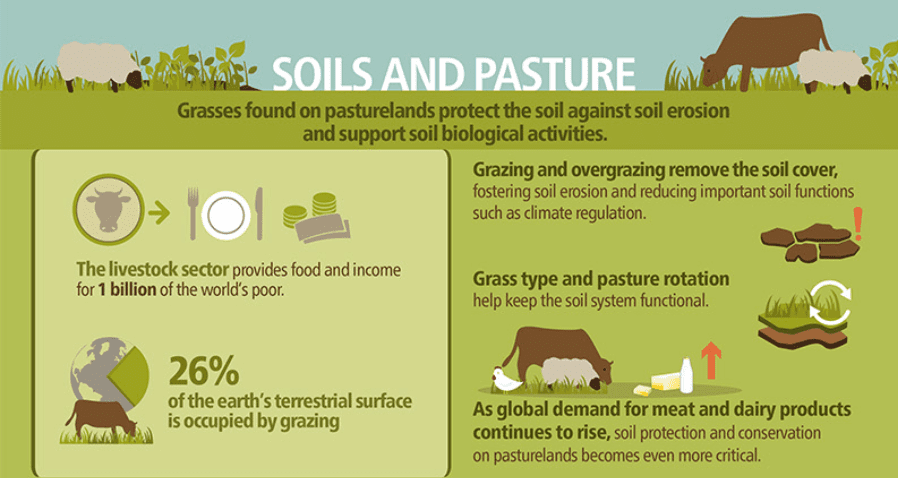Zavod əkinçiliyinin sürətli böyüməsi dünyanın bir çox yerində torpaq və səhralaşmanın deqradasiyasına böyük bir töhfə olmuşdur. Ət və süd məhsullarının tələbi artmağa davam etdikcə, fabrik təsərrüfatları ənənəvi əkinçilik metodlarını əvəz edən qida istehsalının əsas mənbəyinə çevrildi. Bu sənayeləşən əməliyyatlar səmərəli və səmərəli görünsə də, ətraf mühitə təsirləri davamlıdır. Məhdudluqda olan mal-qaranın intensiv istehsalı, münbit torpaq, biomüxtəlifliyin və təbii sərvətlərin itirilməsinə səbəb olan əhəmiyyətli torpaq pozulması və səhralaşması ilə nəticələndi. Bu yazıda, fabrik təsərrüfatlarının torpaq deqradasiyasına və səhralaşmasına töhfə verən və planetimizin potensial nəticələrini müzakirə etmək yollarını araşdıracağıq. Bu məsələnin əsas səbəblərini və təsirlərini araşdıraraq, daha davamlı və etik qida istehsalı metodlarına təcili ehtiyac üzərində işığa işıq salmağı ümid edirik. Bu aktual məsələyə toxunmaq və ərazimizdə və mühitimizdə fabrik təsərrüfatının zərərli təsirlərini azaltmaq üçün bu aktual məsələyə toxunmaq və lazımi tədbirlər görmək çox vacibdir.

Həddindən artıq dərəcədə torpaq eroziyasına səbəb olur
Həddindən artıq otlaq təcrübəsi torpaq eroziyasının ilkin sürücüsü, torpaqların deqradasiyasına və səhralaşmanın başlanmasına töhfə verilmişdir. Heyvandarlıq davamlı olaraq bir ərazini daşıma qabiliyyətindən kənara qoymağa icazə verdikdə, bitki örtüyü, torpağı külək və suyun səbəb olduğu eroziyadan qorumaq üçün bitki örtüyü yetərli deyil. Bitkiləri həddindən artıq artıran bitkilərin daimi çıxarılması, məsələni daha da artıran bitki örtüyünün və böyüməsinin qarşısını alır. Nəticədə, üst qat eroziyaya, bərəkətli torpağın itkisinə, su tutma qabiliyyətinin azalmasına və biomüxtəlifliyin azalmasına səbəb olur. Bu zərərli nəticələr, torpaq eroziyasının qarşısını almaq və torpaqlarımızın sağlamlığını və məhsuldarlığını qorumaq üçün davamlı otlaq idarəetmə strategiyalarına təcili ehtiyacı vurğulayır.
Kimyəvi qaçış su mənbələrini çirkləndirir
Zavod fermalarından kimyəvi axan su, su mənbələrinin çirklənməsində başqa bir əlamətdir. Sənaye kənd təsərrüfatında gübrələrin, pestisidlərin və antibiotiklərin həddindən artıq istifadəsi yaxınlıqdakı çayların, göllərin və yeraltı suların çirklənməsinə səbəb olur. Yağış və suvarma bu kimyəvi maddələrə tarlaları və su obyektlərini yuyub su obyektlərinə və su ekosistemləri və insan sağlamlığı üçün ciddi təhlükə yaratdıqları su obyektlərini yuyur. Gübrələrdən azot və fosforun yüksək konsentrasiyaları zərərli alqal çiçəklənməsinə səbəb ola bilər, suda oksigen səviyyəsini tükənərək və boğulmaz su həyatını itirir. Bundan əlavə, heyvandarlıq əkinçiliyində istifadə olunan antibiotiklər, antibiotik davamlı bakteriyaların inkişafına, suyun keyfiyyətinə və xalq sağlamlığının daha da pozulmasına səbəb ola bilər. Zavod təsərrüfatlarının su mənbələrində kimyəvi axın hissəsinin zərərli təsirlərini azaltmaq üçün lazımi tullantıların idarə olunması sistemləri və kimyəvi girişləri kimi daha davamlı təcrübələrin, kimyəvi girişlərin azaldılması üçün vacibdir.
Daha çox otlaq torpaqları üçün meşəbəyi

Zavod təsərrüfatlarının genişləndirilməsi də torpaq deqradasiyası və səhralılmasına da əhəmiyyətli təsir göstərir. Bu fenomenin əsas sürücülərindən biri daha çox otlaq torpaq yaratmaq məqsədi ilə tıxanır. Mal-qaranın, torpaq eroziyasının qarşısını almağa və torpaq dölünməsinin qarşısını almağa kömək edən təbii bitki örtüyü üçün meşələr təmizləndikcə. Bu, qida maddələrinin tükənməsinə və torpaqların ümumi deqradasiyasına səbəb olan torpaq eroziyasının artması ilə nəticələnir. Bundan əlavə, ağacların çıxarılması su dövrünü azaltdı, bu, ərazinin aridifiyasını daha da artıraraq, bu, ərazinin aridifiyasını daha da artıraraq, bu, ərazinin sönülməsi və yağışın azaldılması, yağışın azaldılması və azaldılmış yağışın azaldılması. Meşə ekosistemlərinin itkisi və intensiv heyvan kənd təsərrüfatı üçün torpaqların çevrilməsi, biomüxtəliflik, yerli icmalar və ekosistemlərimizin uzunmüddətli davamlılığı üçün təhlükə yaradan bir vaxtlar bərəkətli torpaqların deqradasiyaya və səhralılmasına kömək edir. Bu problemləri davamlı torpaq idarəetmə təcrübəsi və ekosistem sağlamlığına və davamlılığını prioritetləşdirən alternativ kənd təsərrüfatı modellərinin təşviqi ilə həll etmək vacibdir.
Sənaye gübrələri torpaq qida maddələrini tükəndirir
Zavod əkinçiliyində ümumiyyətlə istifadə olunan sənaye gübrələri, torpaq qida maddələrinin tükənməsinə töhfə verilmişdir. Bu gübrələr tez-tez çox miqdarda bitkiləri bitirmək üçün konkret qidalar verən sintetik birləşmələrdən ibarətdir. Qısa müddətdə məhsul məhsullarını artıra bilsələr də, torpaqların uzunmüddətli sağlamlığına zərərli təsir göstərə bilərlər. Sənaye gübrələrinin həddindən artıq istifadəsi, azot, fosfor və kalium kimi zəruri elementlərin tükənməsinə səbəb olan torpaqdakı təbii qida balansını poza bilər. Nəticədə, torpaq axınının daha da yüksək dozalarının məhsul böyüməsini təmin etməsi tələb edən torpaq daha da məhsuldar olur. Sintetik gübrələrin bu asılılığı təkcə torpağın bitki həyatını dəstəkləmək qabiliyyətinə xələl gətirir, həm də bu kimyəvi maddələrin yaxınlıqdakı su obyektlərinə sızdırılması kimi su çirkliliyinə də kömək edir. Sənaye gübrələrinə etibarını minimuma endirərkən torpağın təbii bərəkətini bərpa etmək və qorumaq məqsədi daşıyan davamlı kənd təsərrüfatı təcrübələrini araşdırmaq çox vacibdir.
Torpaqdan sui-istifadə səhralaşmasına səbəb olur
Həddindən artıq və düzgün olmayan torpaqlardan istifadə təcrübələri, torpaq deqradasiyası və səhralaşmaya töhfə verməkdə də əhəmiyyətli rol oynayır. Möhkəmləşdirmə, həddindən artıq dərəcədə və düzgün olmayan torpaq idarəetmə üsulları kimi qeyri-sabit təcrübələr, təbii bitki örtüyünün ərazisini eroziyaya və deqradasiyaya həssas qoyaraq süründürür. Bu, bitki artımını dəstəkləmək və ekosistem sağlamlığını qorumaq üçün vacib olan münbit üst qatının itkisinə səbəb olur. Bundan əlavə, bitki örtüyünün çıxarılması təbii su dövrünü pozur, nəticədə artan axın və yeraltı suların doldurulması ilə nəticələnir. Bitki örtüyünün qoruyucu örtüyü olmadan, torpaq küləyin və su eroziyasına həssas olur, səhralaşma prosesini daha da sürətləndirir. Bu məsələyə qarşı mübarizə aparmaq üçün, meşəbəyi, fırlanma otlayan otlaq və torpaq qorunması metodları kimi davamlı torpaq idarəetmə təcrübələrini həyata keçirmək, torpaqlarımızın sağlamlığını qorumaq və bərpa etməkdə çox vacibdir.
Yerli ekosistemlərə mənfi təsir
Zavod təsərrüfatlarının yerli ekosistemlərə mənfi təsiri torpağın deqradasiyası və səhralılmasından kənara çıxır. Bu sənaye miqyaslı kənd təsərrüfatı əməliyyatları tez-tez gübrələrin, pestisidlərin və heyvan tullantılarının axması yolu ilə su mənbələrinin çirklənməsi ilə nəticələnir. Bu çirklənmə, su həyatı və biomüxtəliflik üçün əhəmiyyətli bir təhlükə yaradan çaylar, göllər və qrunt sularına sızdırır. Zavod əkinçiliyində antibiotiklər və böyümə hormonlarının həddindən artıq istifadəsi, yerli ekosistemlərin incə balansını daha da artıran antibiotik davamlı bakteriyaların inkişafı ilə nəticələnə bilər. Bundan əlavə, təbii yaşayış yerlərinin geniş monokula sahələrinə çevrilməsi və ya məhdud heyvan qidalanma əməliyyatları, biomüxtəlifliyin və ekoloji disbalansın itirilməsinə səbəb olan doğma növlərin təbii yaşayış yerlərini pozur. Bu zərərli effektləri həll etmək və yerli ekosistemlərdə vurulan zərərləri azaltmaq üçün daha davamlı və ekoloji cəhətdən şüurlu əkinçilik təcrübələrini qəbul etmək vacibdir.
Sonda, fabrik əkinçilik təcrübələrinin torpaqların deqradasiyasına və səhralılmasına əhəmiyyətli dərəcədə təsir göstərməsi aydındır. Torpaq eroziyasına aparan gübrələrin və pestisidlərin həddindən artıq istifadəsindən, təbii ehtiyatların tükənməsinə və vəhşi təbiətin yaşayış yerlərinin məhv edilməsinə, bu sənaye əkinçilik üsulları uzun müddət davamlı olmur. Hökumətlər və şəxslərin dəstəkləyən fabrik əkinçiliyinin nəticələrini tanımaq vacibdir və bunun əvəzinə ərzaq istehsalının daha davamlı və etik metodlarına diqqət yetirməlidir. Yalnız tədbirlər görmək və dəyişiklik etməklə, planetimizin torpaq və qaynaqlarımızı gələcək nəsillər üçün qorumaq üçün işləyə bilərik.

Tez-tez Verilən Sual
Zavod təsərrüfatları torpaq eroziyasına və torpaq pozğunluğuna necə töhfə verir?
Zavod təsərrüfatları torpaq eroziyasına və torpaq deqradasiyasına bir neçə yolla töhfə verir. Birincisi, kimyəvi gübrələrin və pestisidlərin həddən artıq istifadəsi torpaq eroziyaya səbəb ola bilər, çünki bu maddələr torpaq quruluşunu alçaldır və su saxlamaq qabiliyyətini azaldıqca. İkincisi, fabrik təsərrüfatları tərəfindən istehsal olunan həddindən artıq peyin, düzgün idarə edilmədikdə, yaxınlıqdakı su obyektlərinə, qida çirklənməsinə və daha da torpaq deqradasiyasına səbəb ola bilər. Bundan əlavə, fabrik təsərrüfatlarının inşası üçün torpaqların təmizlənməsi, təbii yaşayış yerlərinin dağılması və məhv edilməsi, torpaq eroziyasını daha da kəskinləşdirmək və torpaq pozulması ilə nəticələnə bilər. Ümumiyyətlə, zavod təsərrüfatının intensiv və qeyri-sabit təcrübələri torpaq və torpaq sağlamlığının pozulmasına kömək edir.
Zavod fermalarında istifadə hansı xüsusi əkinçilik təcrübəsi səhralaşmaya kömək edir?
Zavod ferması, həddindən artıq suvarma, həddindən artıq suvarma və meşələrin meşəbəyi kimi xüsusi əkinçilik təcrübəsi ilə səhralaşmaya kömək edir. Uzunluğu, heyvandarlıq bir ərazidə bir ərazidə bir ərazidə cəmlənmiş olduqda, bitki örtüyünün və torpaq eroziyasının pozulmasına səbəb olur. Həddindən artıq suvarma yeraltı su ehtiyatlarını, su masalarının azaldılması və səhralaşmasına səbəb olur. Bundan əlavə, fabrik təsərrüfatları tez-tez əkinçilik üçün torpaq sahələrini təmizləyir, nəticədə meşəbəyi göstərir. Bu ağacların çıxarılması biomüxtəlifliyin azalmasına, torpaq eroziyasını artırmağa və səhralaşmanın qarşısını almağa kömək edən dəyərli ekosistemlərin itkisinə səbəb olur.
Zavod əkinçiliyində kimyəvi gübrələrin və pestisidlərin həddindən artıq istifadəsi, torpaq pozğunluğuna necə təsir edir?
Zavod əkinçiliyindəki kimyəvi gübrələrin və pestisidlərin həddindən artıq istifadəsi bir neçə yolla torpaq deqradasiyasına töhfə verə bilər. Birincisi, bu kimyəvi maddələr torpağa (yeraltı suları çirkləndirə bilər, suyun çirklənməsinə və bitkilərin, heyvanların və insanların sağlamlığına təsir edən yeraltı suları çirkləndirə bilər. İkincisi, gübrələrin həddindən artıq istifadəsi, zamanla torpağın məhsuldarlığının tükənməsinə səbəb olan qidalı dengesizliklərlə nəticələnə bilər. Bu, məhsuldarlığın azalmasına və məhsuldarlığı qorumaq üçün daha çox kimyəvi maddələrin ehtiyacının azalmasına səbəb olur. Bundan əlavə, pestisidlər sağlam torpaq quruluşu və qida velosipedini qorumağa kömək edən torpaq qurdları və mikroblar kimi faydalı orqanizmləri öldürə bilərlər. Ümumiyyətlə, zavod təsərrüfatında kimyəvi gübrələrin və pestisidlərin həddindən artıq istifadəsi torpaqların deqradasiyasını sürətləndirə və kənd təsərrüfatı təcrübələrinin uzunmüddətli davamlılığına zərər verə bilər.
Fabrika təsərrüfatlarının genişlənməsində meşələrin töhfəsi və səhralaşmanın töhfəsində hansı rol oynayır?
Möhkəmləşdirmə fabrik təsərrüfatlarının genişlənməsində mühüm rol oynayır və səhralaşmaya kömək edir. Meşələr kənd təsərrüfatı məqsədləri üçün təmizləndikdə, fabrik təsərrüfatları üçün daha çox yer yaratmaq kimi, müxtəlif növlər üçün çox vacib yaşayış yerlərinin məhv edilməsinə və yerli ekosistemləri pozmağa səbəb olur. Bundan əlavə, meşəlləşdirmə karbon qazının atmosferə buraxılmasına, iqlim dəyişikliyinə kömək edir. Ağacların itkisi, torpaq eroziyasına və səhraya bənzər şərtlərin yayılmasına qədər nəm saxlamaq üçün torpaqların nəm saxlamasını da azaldır. Ümumilikdə, meşələrin fabrik təsərrüfatlarının genişləndirilməsi və səhralaşmanın genişləndirilməsini yandırır, ətraf mühitin əhəmiyyətli problemləri pozur.
Fabrika təsərrüfatları yeraltı su ehtiyatlarının tükənməsinə və torpaq deqradasiyasına təsirinə necə töhfə verir?
Zavod təsərrüfatları yeraltı su ehtiyatlarının tükənməsinə və həddindən artıq su istifadəsi və çirklənmə yolu ilə torpaq pozulmasına töhfə verir. Bu fermalar suvarma, heyvan istehlakı və tullantıların idarə olunması üçün çox miqdarda su tələb edir. Həddindən artıq su istifadəsi yeraltı su ehtiyatlarını tükəndirir, ətrafdakı icmalar və ekosistemlər üçün azalmışdır. Bundan əlavə, peyin və kimyəvi gübrələr də daxil olmaqla, fabrik təsərrüfatları tərəfindən istehsal olunan tullantılar, yeraltı suları axan və seepaj vasitəsilə çirkləndirə bilər. Bu çirklənmə su ehtiyatlarının keyfiyyətini daha da pisləşdirir və yaxınlıqdakı ekosistemlərə zərər verə bilər. Ümumiyyətlə, fabrik təsərrüfatının intensiv təcrübələri su ehtiyatlarından və torpaqların pozulmamış istifadəsinə töhfə verir.















































